Quotes & Sayings About Ethics Aristotle
Enjoy reading and share 32 famous quotes about Ethics Aristotle with everyone.
Top Ethics Aristotle Quotes
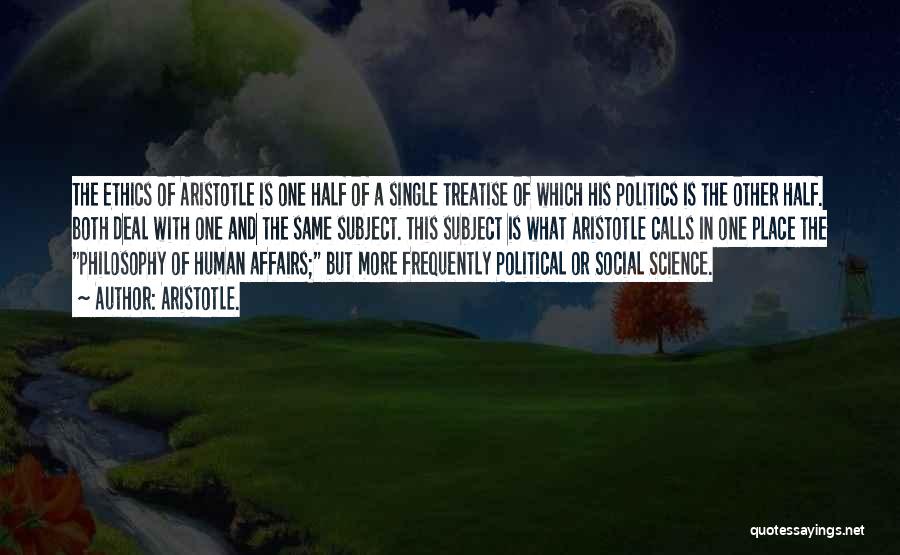
The Ethics of Aristotle is one half of a single treatise of which his Politics is the other half. Both deal with one and the same subject. This subject is what Aristotle calls in one place the "philosophy of human affairs;" but more frequently Political or Social Science. — Aristotle.
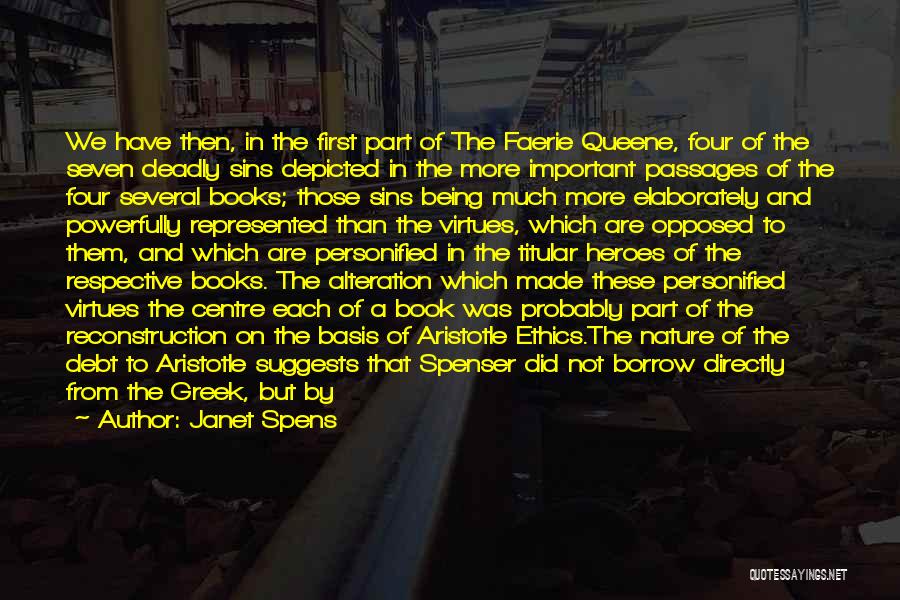
We have then, in the first part of The Faerie Queene, four of the seven deadly sins depicted in the more important passages of the four several books; those sins being much more elaborately and powerfully represented than the virtues, which are opposed to them, and which are personified in the titular heroes of the respective books. The alteration which made these personified virtues the centre each of a book was probably part of the reconstruction on the basis of Aristotle Ethics.
The nature of the debt to Aristotle suggests that Spenser did not borrow directly from the Greek, but by way of modern translations. — Janet Spens
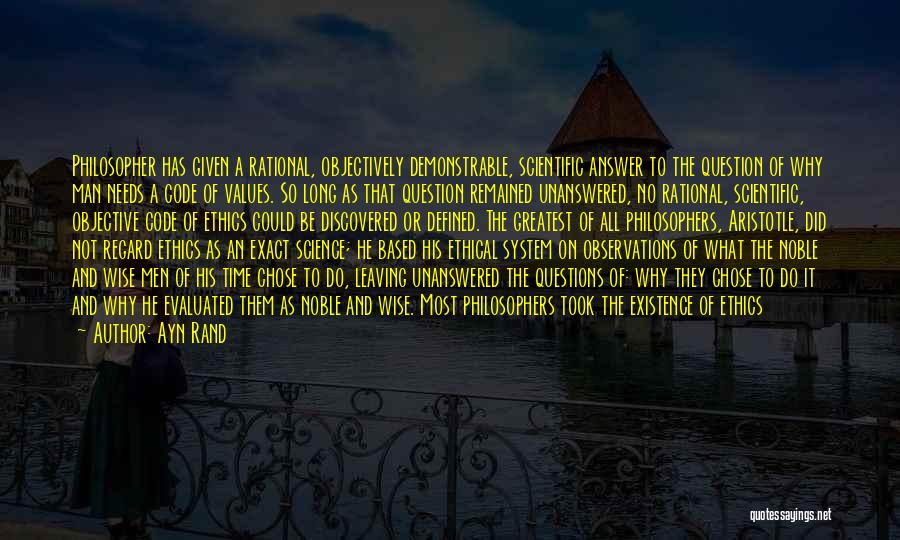
Philosopher has given a rational, objectively demonstrable, scientific answer to the question of why man needs a code of values. So long as that question remained unanswered, no rational, scientific, objective code of ethics could be discovered or defined. The greatest of all philosophers, Aristotle, did not regard ethics as an exact science; he based his ethical system on observations of what the noble and wise men of his time chose to do, leaving unanswered the questions of: why they chose to do it and why he evaluated them as noble and wise. Most philosophers took the existence of ethics for granted, as the given, as a historical fact, and were not concerned with discovering its metaphysical cause or objective validation. Many of them attempted to break the traditional monopoly of mysticism in the field of ethics and, allegedly, to define a rational, scientific, nonreligious morality. But their attempts consisted of trying to justify them on social grounds, — Ayn Rand
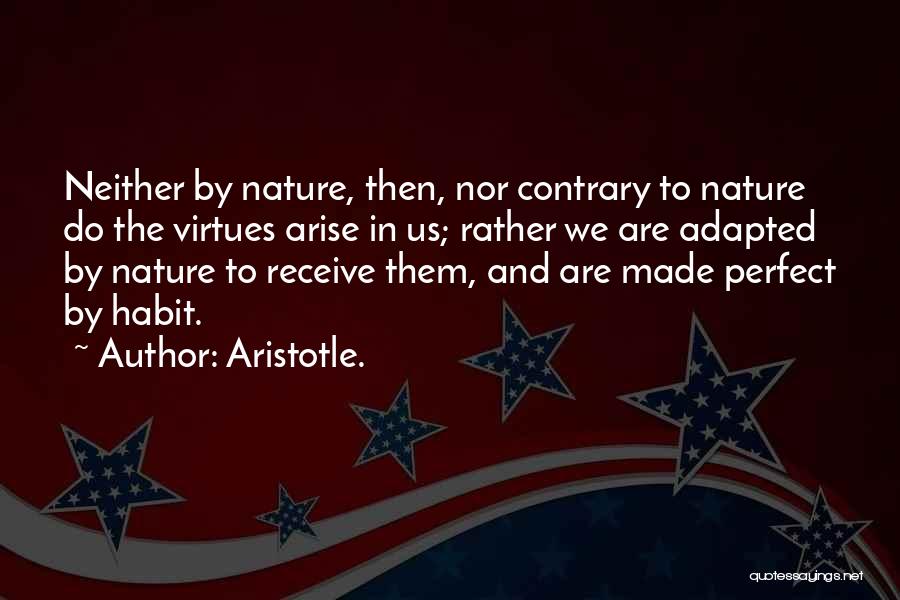
Neither by nature, then, nor contrary to nature do the virtues arise in us; rather we are adapted by nature to receive them, and are made perfect by habit. — Aristotle.

Some of you read with me 40 years ago a portion of Aristotle's Ethics, a selection of passages that describe his idea of happiness. You may not remember too well. — Charles Van Doren
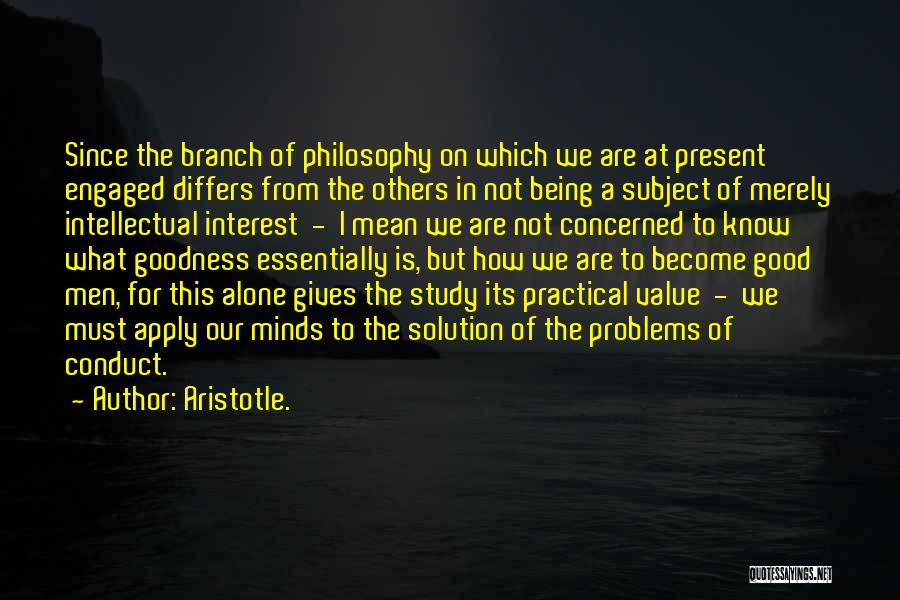
Since the branch of philosophy on which we are at present engaged differs from the others in not being a subject of merely intellectual interest - I mean we are not concerned to know what goodness essentially is, but how we are to become good men, for this alone gives the study its practical value - we must apply our minds to the solution of the problems of conduct. — Aristotle.
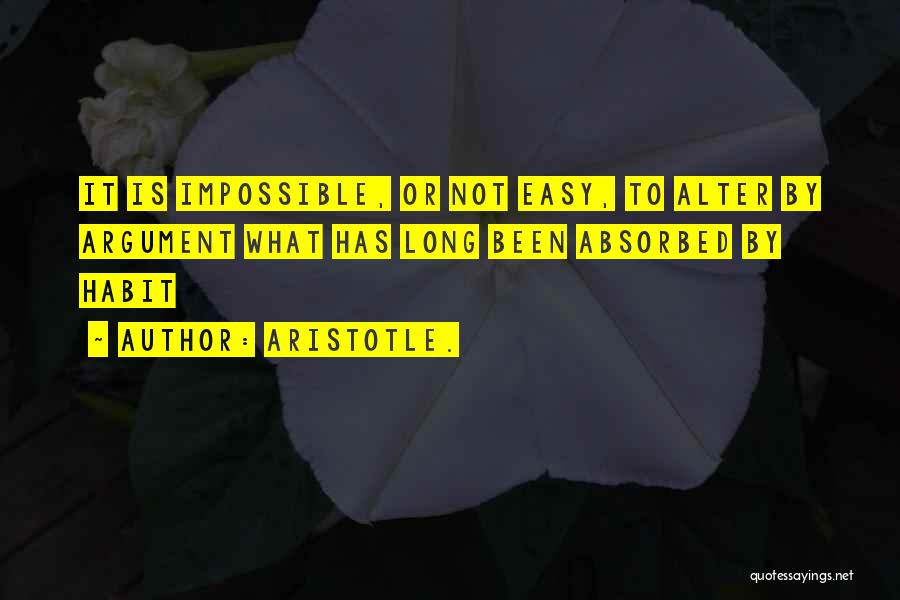
It is impossible, or not easy, to alter by argument what has long been absorbed by habit — Aristotle.

Happiness seems to depend on leisure, because we work to have leisure, and wage war to live in peace. — Aristotle.

Where it is in our power to act, it is also in our power to not act. — Aristotle.
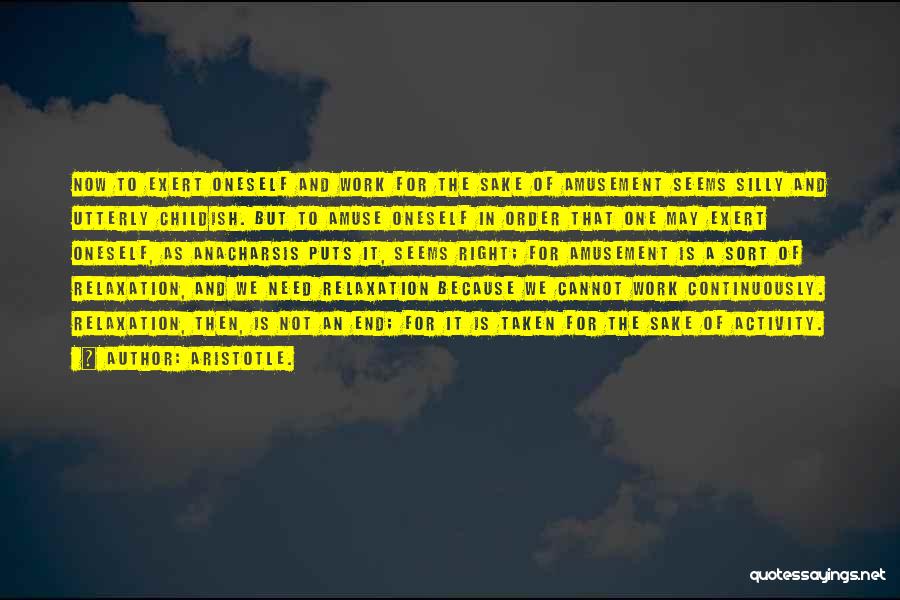
Now to exert oneself and work for the sake of amusement seems silly and utterly childish. But to amuse oneself in order that one may exert oneself, as Anacharsis puts it, seems right; for amusement is a sort of relaxation, and we need relaxation because we cannot work continuously. Relaxation, then, is not an end; for it is taken for the sake of activity. — Aristotle.

But happiness is a difficult thing-it is, as Aristotle posited in The Nicomachean Ethics, an activity, is is about good social behavior, about being a solid citizen. Happiness is about community, intimacy, relationships, rootedness, closeness, family, stability, a sense of place, a feeling of love. And in this country, where people move from state to state and city to city so much, where rootlessness is almost a virtue ("anywhere I hang my hat ... is someone else's home"), where family units regularly implode and leave behind fragments of divorce, where the long loneliness of life finds its antidote not in a hardy, ancient culture (as it would in Europe), not in some blood-deep tribal rites (as it would in the few still-hale Third World nations), but in our vast repository of pop culture, of consumer goods, of cotton candy for all-in this America, happiness is hard. — Elizabeth Wurtzel
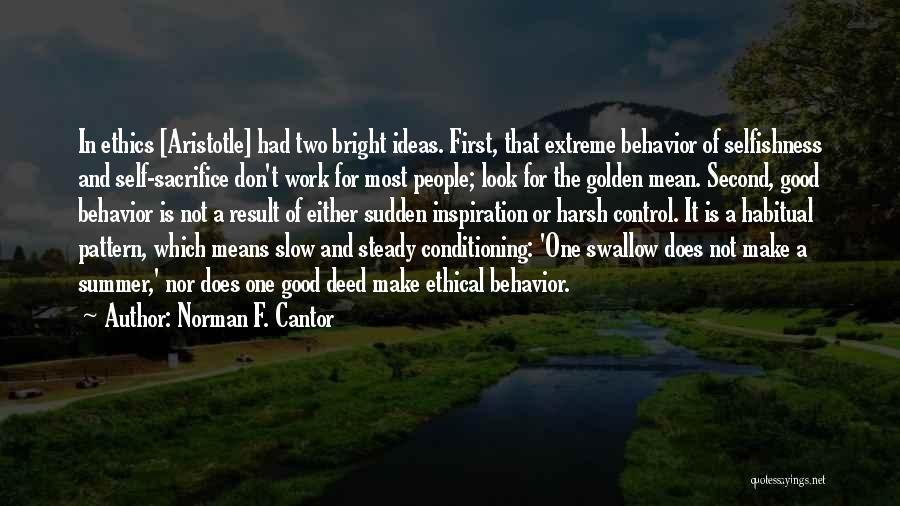
In ethics [Aristotle] had two bright ideas. First, that extreme behavior of selfishness and self-sacrifice don't work for most people; look for the golden mean. Second, good behavior is not a result of either sudden inspiration or harsh control. It is a habitual pattern, which means slow and steady conditioning: 'One swallow does not make a summer,' nor does one good deed make ethical behavior. — Norman F. Cantor

I count him braver who overcomes his desires than him who conquers his enemies, for the hardest victory is over self. — Aristotle.
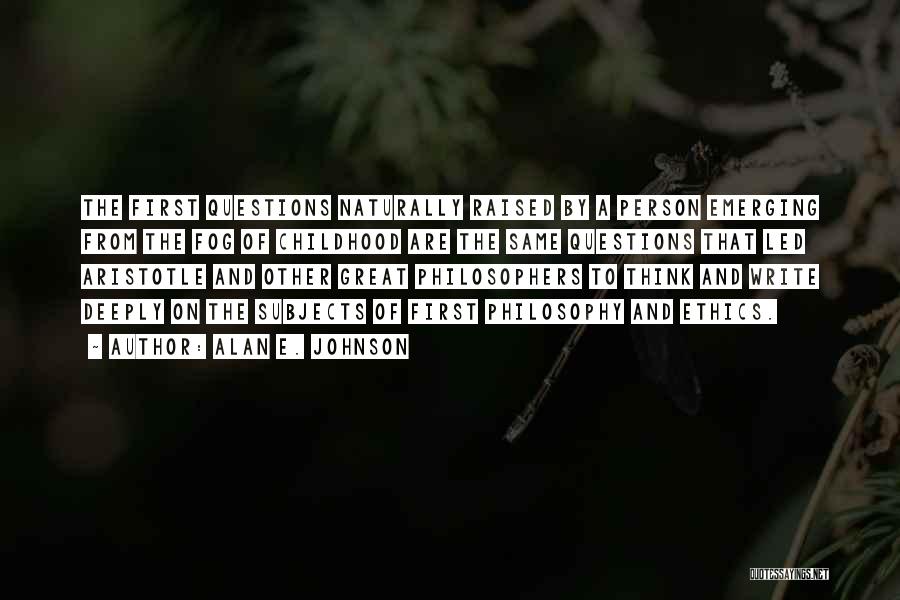
The first questions naturally raised by a person emerging from the fog of childhood are the same questions that led Aristotle and other great philosophers to think and write deeply on the subjects of first philosophy and ethics. — Alan E. Johnson
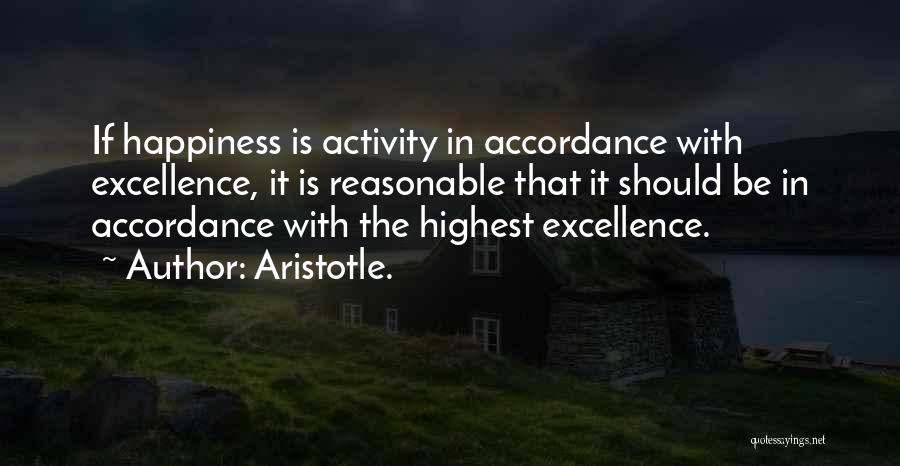
If happiness is activity in accordance with excellence, it is reasonable that it should be in accordance with the highest excellence. — Aristotle.

Every skill and every inquiry, and similarly every action and rational choice, is thought to aim at some good; and so the good had been aptly described as that at which everything aims. — Aristotle.
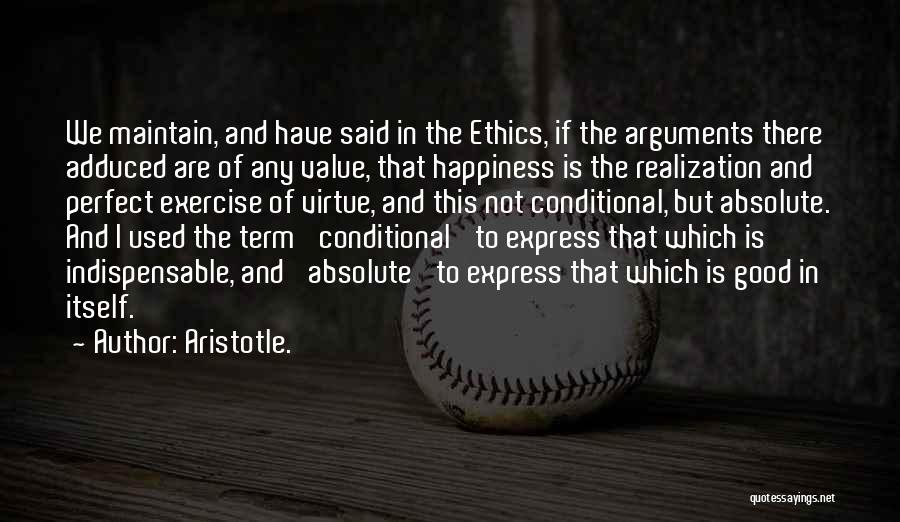
We maintain, and have said in the Ethics, if the arguments there adduced are of any value, that happiness is the realization and perfect exercise of virtue, and this not conditional, but absolute. And I used the term 'conditional' to express that which is indispensable, and 'absolute' to express that which is good in itself. — Aristotle.
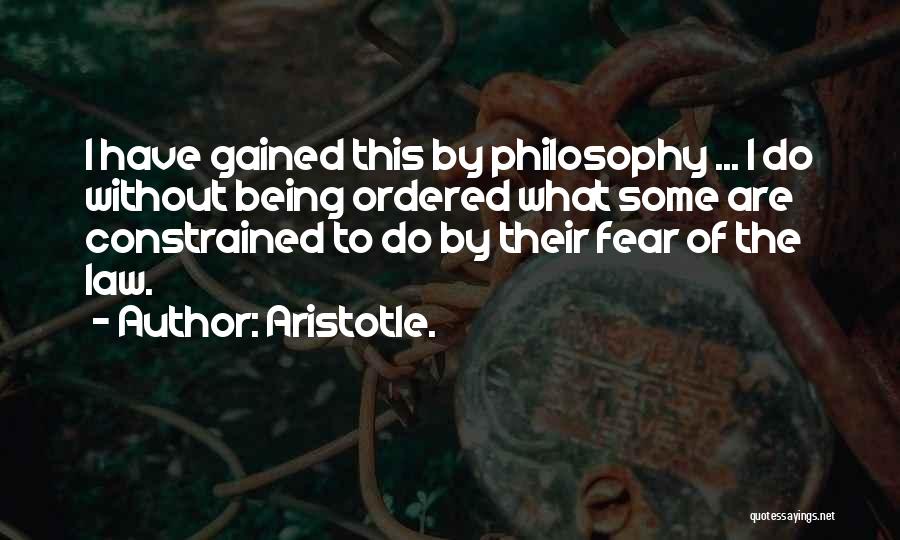
I have gained this by philosophy ... I do without being ordered what some are constrained to do by their fear of the law. — Aristotle.
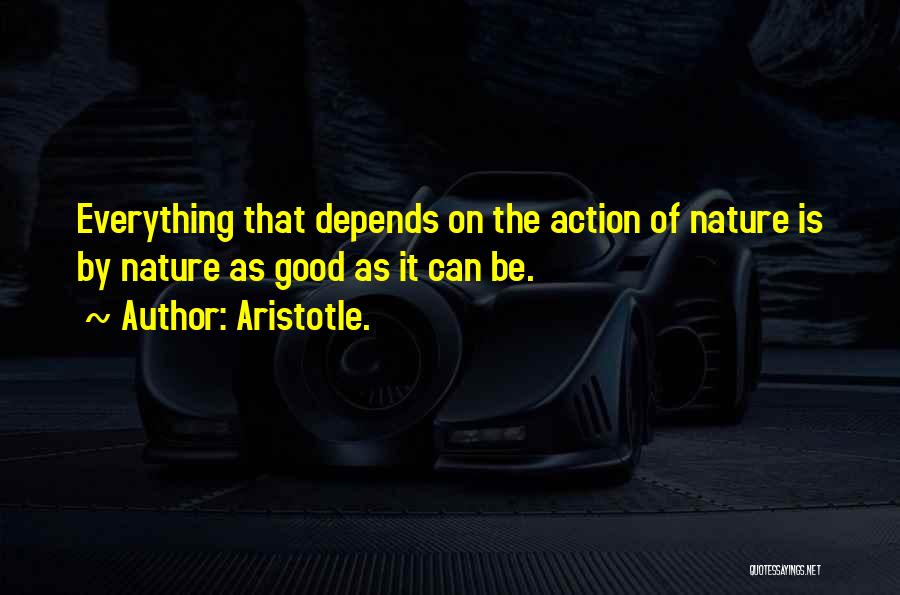
Everything that depends on the action of nature is by nature as good as it can be. — Aristotle.
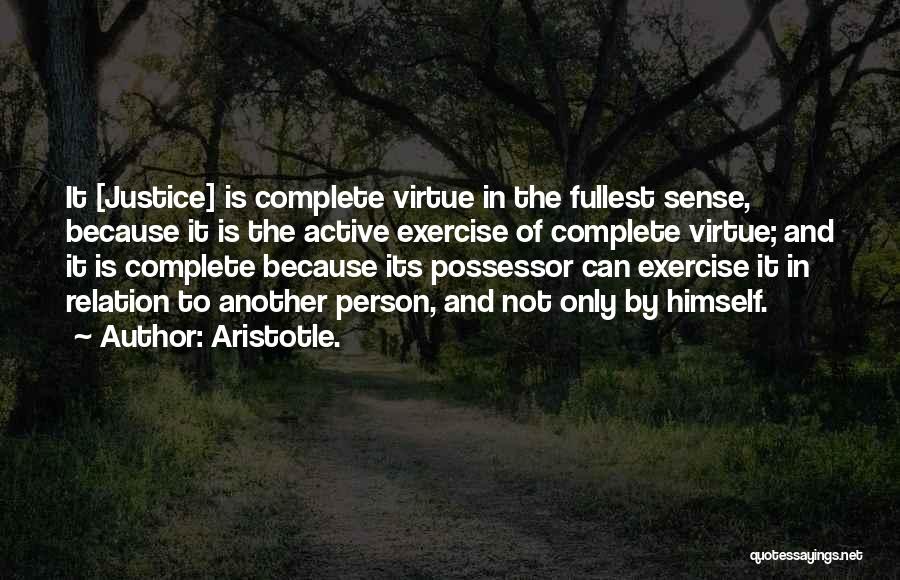
It [Justice] is complete virtue in the fullest sense, because it is the active exercise of complete virtue; and it is complete because its possessor can exercise it in relation to another person, and not only by himself. — Aristotle.
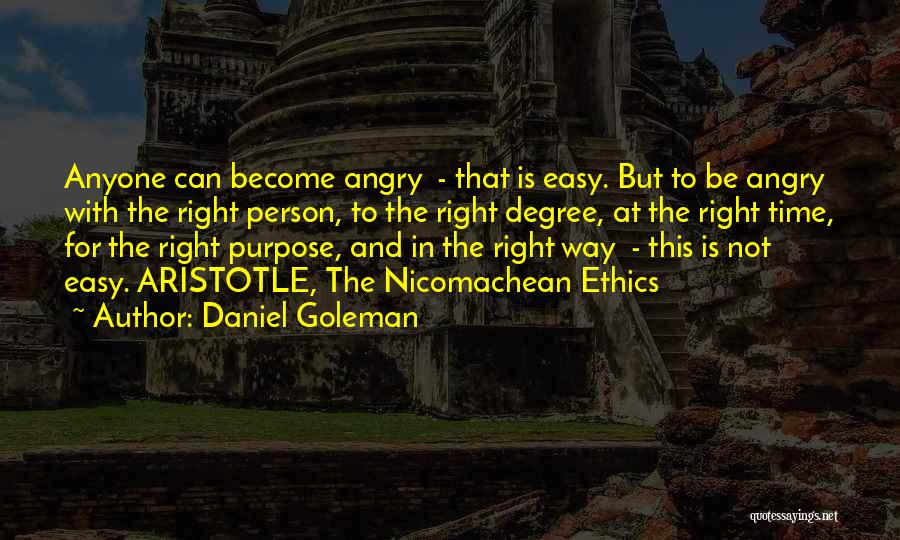
Anyone can become angry - that is easy. But to be angry with the right person, to the right degree, at the right time, for the right purpose, and in the right way - this is not easy. ARISTOTLE, The Nicomachean Ethics — Daniel Goleman
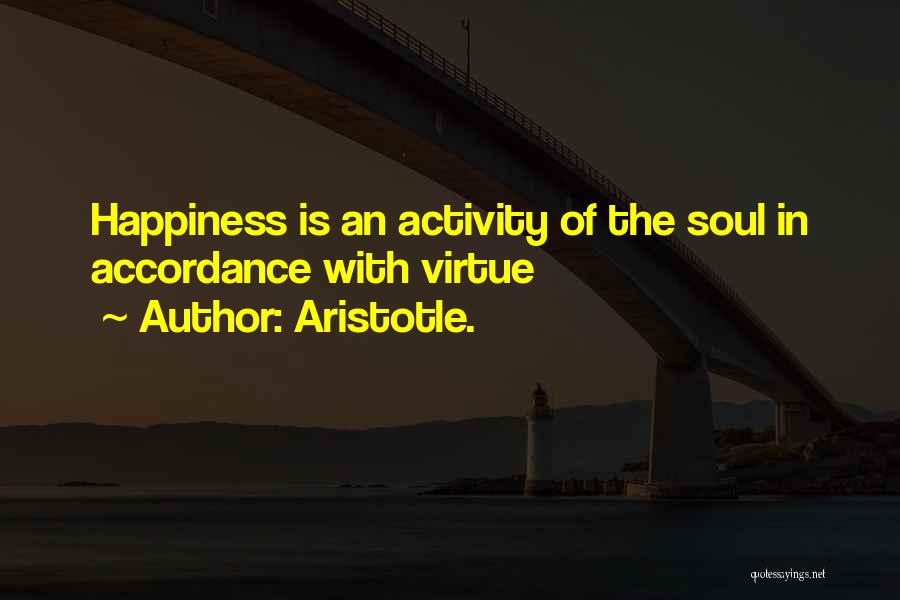
Happiness is an activity of the soul in accordance with virtue — Aristotle.

Life in accordance with intellect is best and pleasantest, since this, more than anything else, constitutes humanity. — Aristotle.

It is well said, then, that it is by doing just acts that the just man is produced, and by doing temperate acts the temperate man; without doing these no one would have even a prospect of becoming good. — Aristotle.
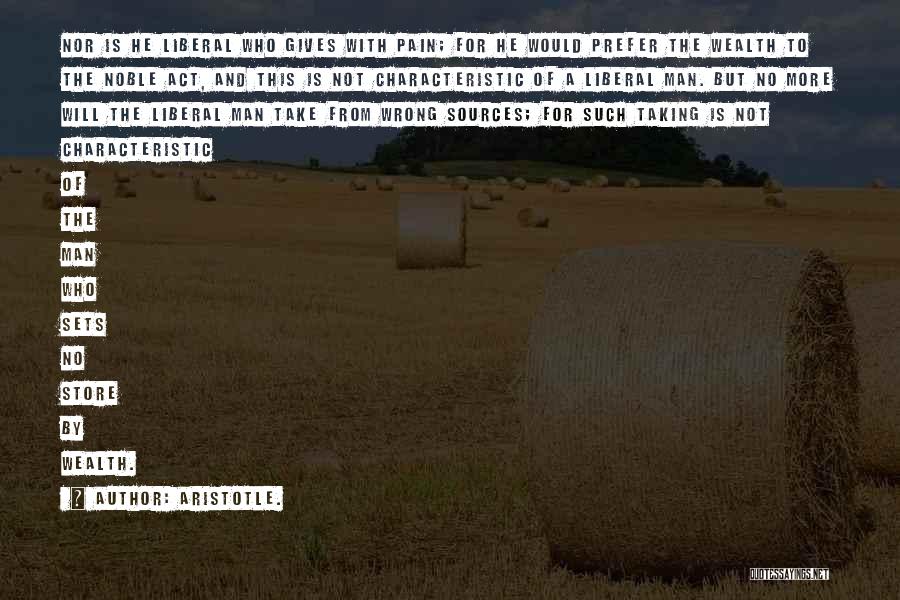
Nor is he liberal who gives with pain; for he would prefer the wealth to the noble act, and this is not characteristic of a liberal man. But no more will the liberal man take from wrong sources; for such taking is not characteristic of the man who sets no store by wealth. — Aristotle.
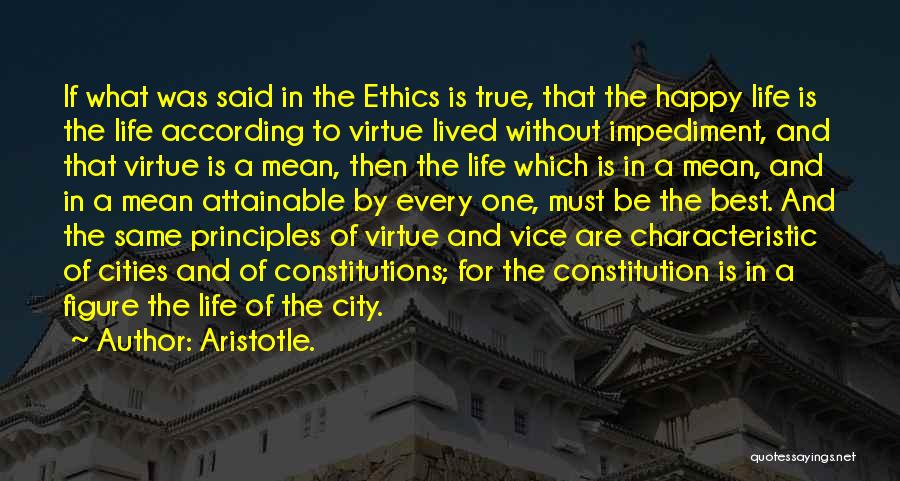
If what was said in the Ethics is true, that the happy life is the life according to virtue lived without impediment, and that virtue is a mean, then the life which is in a mean, and in a mean attainable by every one, must be the best. And the same principles of virtue and vice are characteristic of cities and of constitutions; for the constitution is in a figure the life of the city. — Aristotle.
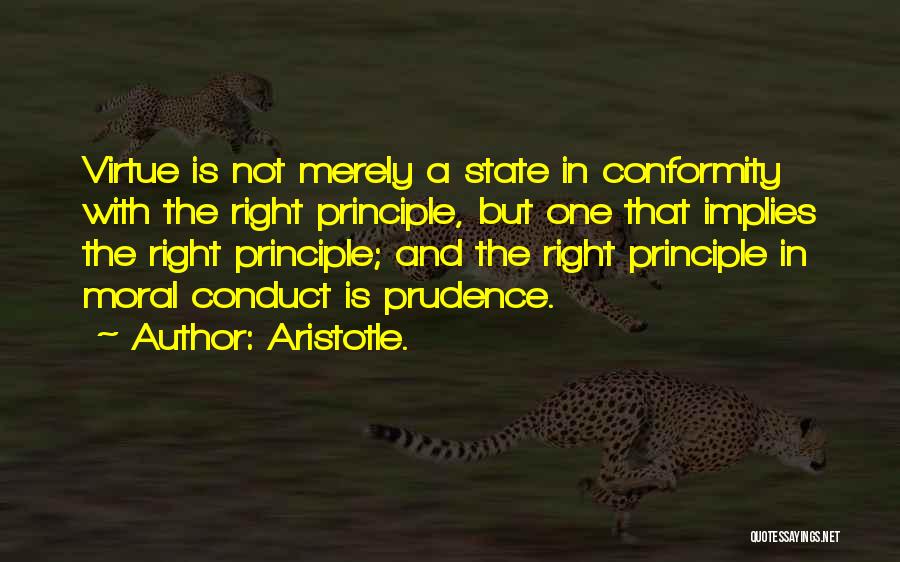
Virtue is not merely a state in conformity with the right principle, but one that implies the right principle; and the right principle in moral conduct is prudence. — Aristotle.
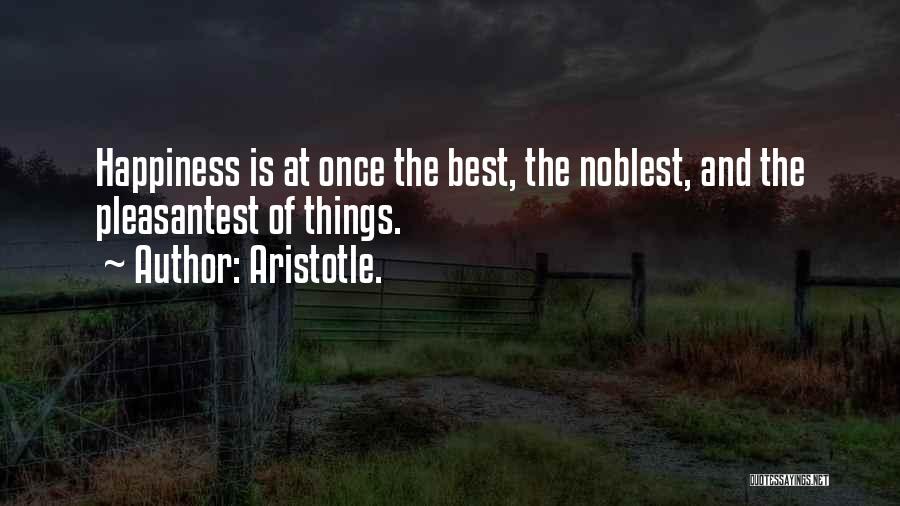
Happiness is at once the best, the noblest, and the pleasantest of things. — Aristotle.
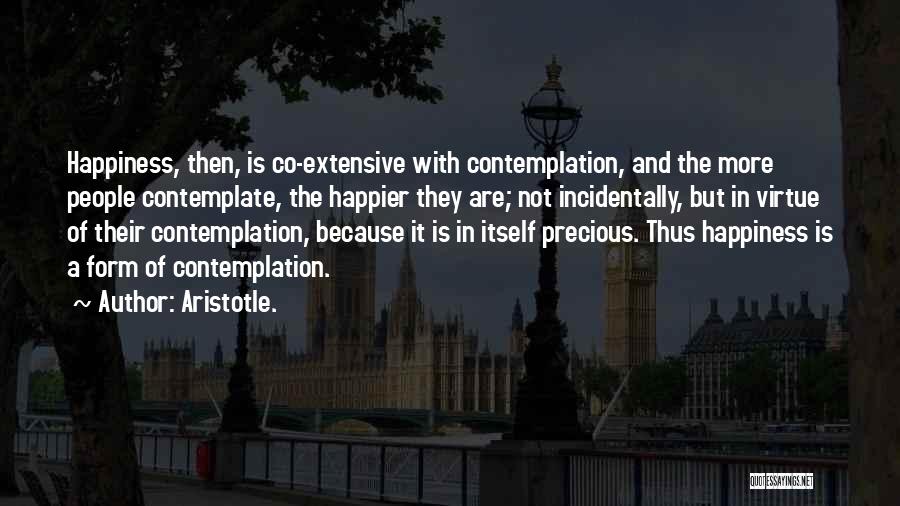
Happiness, then, is co-extensive with contemplation, and the more people contemplate, the happier they are; not incidentally, but in virtue of their contemplation, because it is in itself precious. Thus happiness is a form of contemplation. — Aristotle.

To call the Form [of the Good] eternal is misleading: that something lasts forever does not render it any the better, any more than long-enduring whiteness is whiter than ephemeral whiteness. — Alasdair MacIntyre
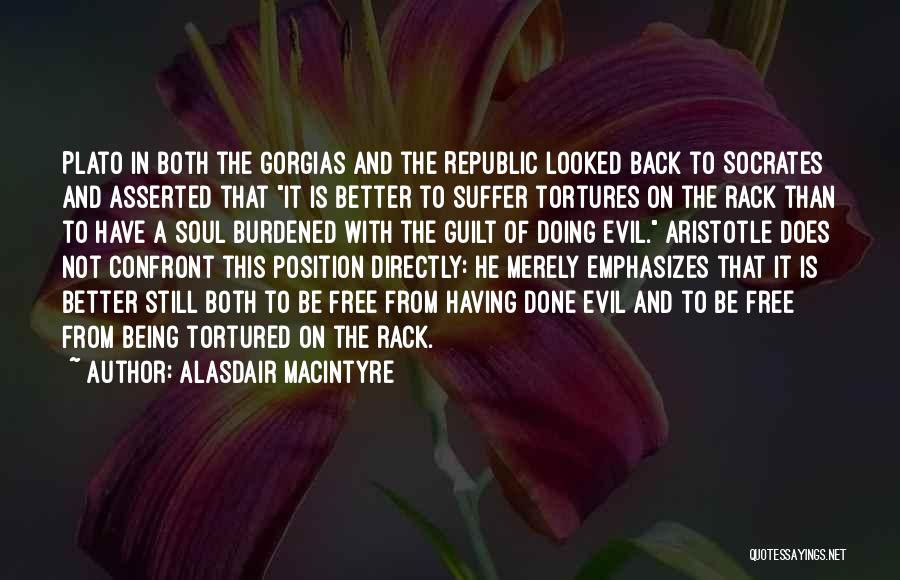
Plato in both the Gorgias and the Republic looked back to Socrates and asserted that "it is better to suffer tortures on the rack than to have a soul burdened with the guilt of doing evil." Aristotle does not confront this position directly: he merely emphasizes that it is better still both to be free from having done evil and to be free from being tortured on the rack. — Alasdair MacIntyre
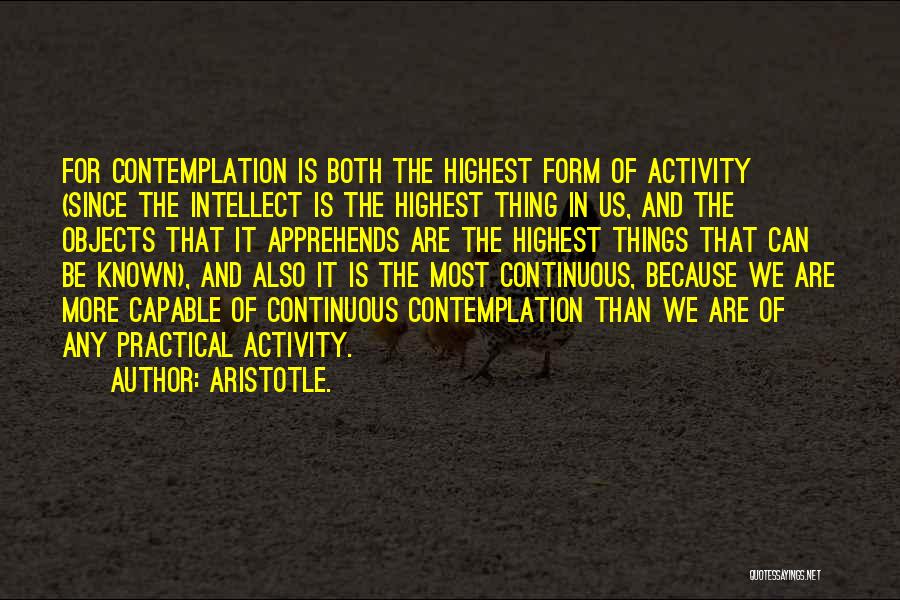
For contemplation is both the highest form of activity (since the intellect is the highest thing in us, and the objects that it apprehends are the highest things that can be known), and also it is the most continuous, because we are more capable of continuous contemplation than we are of any practical activity. — Aristotle.





